Geography topic review morning – Year 2s
We had a topic review morning today with the Year 2 children – recapping learning from last year. We particularly looked at the big concepts of PLACE, SPACE, SCALE and INTERDEPENDENCE.
We used concentric circles to show how Scholes is in Leeds, Leeds is in England, England is in Europe and Europe is in the world.
We looked at human and physical features in different environments.
We marked the equator, southern and northern hemispheres on a ball.
We also played North, South, East, West to review the points of a compass.
5/6A Class Assembly
Just a quick reminder that Class 5/6A will be hosting our Class Assembly this coming Friday afternoon, and we can’t wait to welcome parents, grandparents and family members into school. The pupils have been working really hard in putting the assembly together to showcase all of their learning over the past 6 weeks.
3,4C Class News
Over the last week, we have been working really hard in 3,4C.
In History, we have researched information about Ancient Greek inventions and creations. They created theatre, introduced democracy and invented the Olympic Games. We have also been debating if we would rather be a Spartan or an Athenian in Ancient Greek times.
In Reading, we have looked at different examples of discussion texts, considering the arguments for and against wearing school uniform. Next week, we are going to write our own discussion text.
We are continuing to work on our number facts and times tables using Numbots and Times Tables Rock Stars. You can help at home by encouraging your child to count, recall number facts and log on regularly.
As a class, we collected many items for our Harvest collection – thank you to everyone who donated.
Well done 3,4C!
Science – looking for seasonal changes on our autumn walk
All the key stage 1 classes had a lovely autumnal walk around our school grounds on Monday. We returned our conker collection back into the food chain and looked for signs of autumn too.
Help at home by talking about seasonal changes you can see : the days getting shorter, leaves falling from trees and animals hibernating.
‘I respect myself’
Today we have been discussing our Living and Learning statement, ‘I respect myself.’ The class came up with many reasons why we are all different. As a class, we came to the conclusion that we are all different and unique. We respect our differences as well as other peoples.
We then created lots of different characters on A4 paper. We started by drawing a head. We then folded our paper and passed it on to another person in the class. We repeated this until each character had a full body. Take a look at some of our weird and wonderful creations!




Autumn walk – all Y1 and Y2 children bring wellies on Monday 10th October!
We are going on an autumn walk around the school grounds on Monday. Please bring a pair of wellies as the field is muddy!
Class 5/6A News
Hard to believe that we only have two weeks of this half-term left! Let’s catch up on what Class 5/6A have been getting up to this week.
A big thank you to everyone who came to see us in our Watch Us While We Work session earlier this week. It was great to be able to welcome you into our classrooms, and we hope you came away from the session with some useful tools to support your child’s learning at home.
Ancient Egypt has been the focus for the majority of our learning this week. In Reading, we held a debate on whether Howard Carter (who discovered the intact tomb of the Pharaoh Tutankhamun in November 1922) was a positive figure in history. Our pupils used a variety of resources to build a case for their argument, and then practiced their debating, reasoning and listening skills to discuss the question.


In Topic, we have looked at how the Ancient Egyptians used the River Nile to survive and prosper, and wrote our names on papyrus in hieroglyphics. Science saw us delve into the murky world of bacteria and microbes, and building on our learning from earlier in the term, use Carl Linnaeus’ classification system to create a key for various microbes.
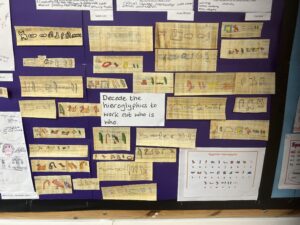
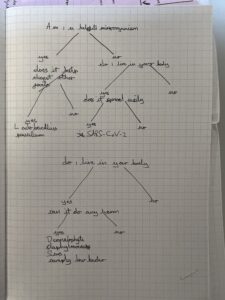
Good luck to all of our Year 6 pupils who will be competing in the cross-country competition at Brigshaw High School on Monday. We wish you the best of luck! Next Friday sees Class 5/6A hosting their class assembly. We look forward to welcoming the parents and families of Class 5/6A into school for our performance.
Just time to look back on our certificate winners for this week.
Living and Learning – Gene. Showing real maturity with his answers in class discussions, providing thoughtful responses and always showing respect to his classmates.
Sport – Bethany C. Gave 110% in our circuit training this week. Tackled every exercise with enthusiasm and a huge smile on her face.
Great learning – Amelia. Constantly produces well-presented work in all subjects, a willingness to learn and makes the right choice first time, every time!
Have a lovely weekend!
3,4A Science
Science: Living things and their habitats
In 3,4A we also enjoyed our hunt around the school grounds for invertebrates. Once back in class, we shared our findings and used the data to create bar graphs.


Autumn
Thank you for returning your autumn bags! This week, we began to look at their contents. Children enjoyed talking about what they had found and where they found their autumn treasure. Don’t worry if you haven’t had a chance to go for a walk yet, there’s still time. Please return your bag to Nursery over the next two weeks.
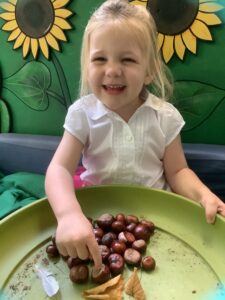

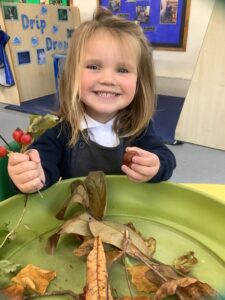
We’ve been learning all about autumn this week; we talked about the changes that we could see around us in our Nursery garden. Children noticed that the leaves were changing colour and falling from the branches. We listened to a song about autumn leaves falling down and named lots of different coloured leaves that we could see outside. We also began our group time learning activities this week; one of our maths activities was to sort a box full of autumn treasure. Children talked about big conkers and little conkers and sorted them into piles. We also sorted the autumn things into ‘types’ of things such as conkers, sticks and leaves.
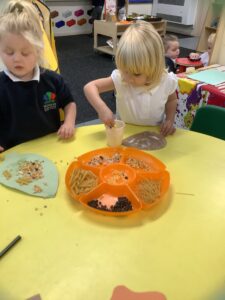


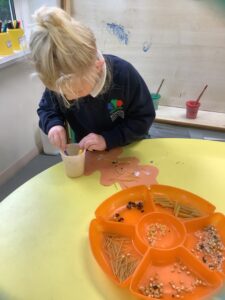



In our story corner, children have enjoyed listening to the story of ‘We’re going on a bear hunt’. They’re getting really good at re-telling the story and joining in with the repeated refrains. We loved listening to the author telling the story, too. Have a listen at home and join in together with the sound effects!
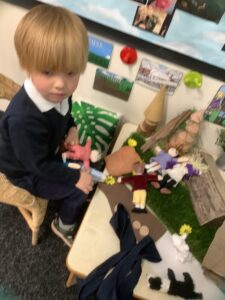
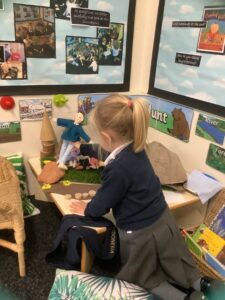
Outside, children went on their own bear hunt. We took our shoes and socks off, to see what ‘squelch, squerch’ in the mud and ‘splash splosh’ in the cold river felt like. It was great fun!

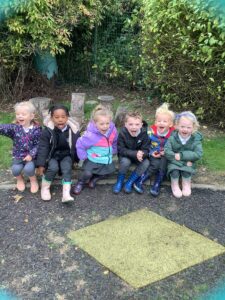
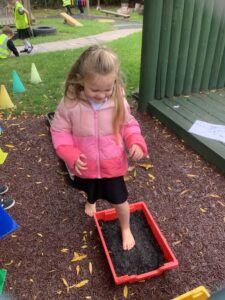
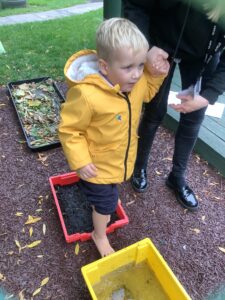
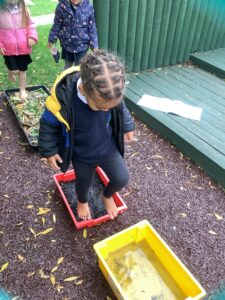
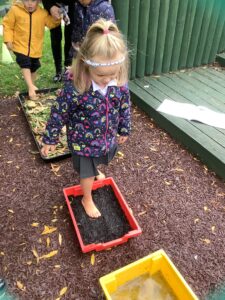
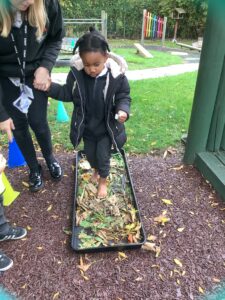
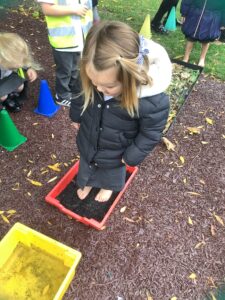
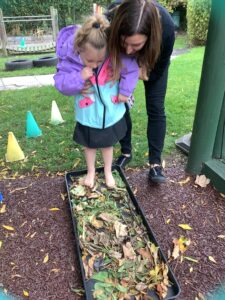
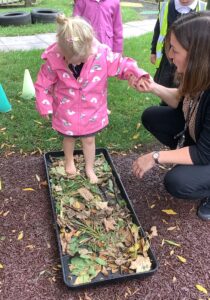
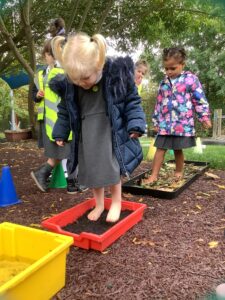
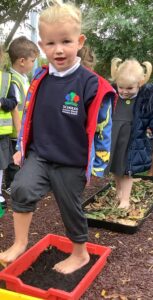

Next week, we’ll continue to learn about autumn and will look at some artwork by Andy Goldsworthy. We also noticed that some children were talking about part of the story from ‘Goldilocks and the Three Bears‘ last week, so we’ll follow this interest by reading the story and exploring porridge oats in the sensory area. If you have a copy at home, please share it together at bedtime or watch this CBeebies story time, to help familiarise your child with it.
Singing – Make your own kind of music
We added some singing to our golden assembly today; Make your own kind of music by Paloma Faith. It’s all about being yourself and making your own choices and we love singing it. Here is a video of KS1 singing some of the song!














